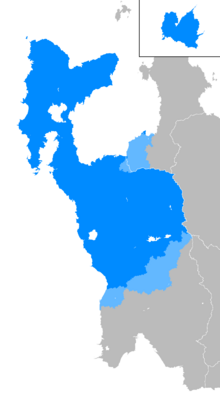Kiyortzani Language: Difference between revisions
(created page) |
(added categories and started on alphabet) |
||
| (2 intermediate revisions by the same user not shown) | |||
| Line 8: | Line 8: | ||
| imagealt = | | imagealt = | ||
| imagecaption = | | imagecaption = | ||
| pronunciation = | | pronunciation = ['itikovi 'kijort͡sani] | ||
| states = [[Kiyortza]] <!-- or state --> | | states = [[Kiyortza]] <!-- or state --> | ||
| region = | | region = | ||
| Line 27: | Line 27: | ||
| revived-category = <!-- or revived-cat --> | | revived-category = <!-- or revived-cat --> | ||
| familycolor = | | familycolor = | ||
| family = Kiyortzani | | family = [[Kiyortzani Languages|Kiyortzani]] | ||
| fam1 = | | fam1 = [[Itikovi]] | ||
| fam2 = | | fam2 = | ||
| fam3 = <!-- up to fam15 --> | | fam3 = <!-- up to fam15 --> | ||
| Line 41: | Line 41: | ||
| dia1 = | | dia1 = | ||
| dia2 = <!-- up to dia20 --> | | dia2 = <!-- up to dia20 --> | ||
| script = Riyaki Script | | script = [[Riyaki Script]] | ||
| sign = | | sign = | ||
| posteriori = | | posteriori = | ||
| nation = Kiyortza | | nation = [[Kiyortza]] | ||
| minority = | | minority = [[Aleni]] | ||
| agency = | | agency = | ||
| iso1 = | | iso1 = | ||
| Line 80: | Line 80: | ||
| lingua_ref = | | lingua_ref = | ||
| ietf = | | ietf = | ||
| map = | | map = Itikovi Language.png | ||
| mapsize = | | mapsize = | ||
| mapalt = | | mapalt = | ||
| mapcaption = | | mapcaption = {{color box|#008bff}} Regions where Itikovi is the majority language<br>{{color box|#63b8ff}} Regions where Itikovi is a minority language (>30%) | ||
| map2 = | | map2 = | ||
| mapalt2 = | | mapalt2 = | ||
| Line 91: | Line 91: | ||
| notice = IPA | | notice = IPA | ||
}} | }} | ||
Itikovi-Kiyortzani, more commonly referred to as simply Kiyortzani, is a Kiyortzani language first spoken by the Itikov in modern day central [[Kiyortza]], later to spread into the widely spoken language it is today. The language is named after the Itikovi, a Central Kiyortzani people group, initially settled on the banks of the Itikov River. Both names stem from ''Iti Kova'', or "Buffalo Falls", the name of a prominent waterfall in the region. Itikovi is most closely related to Riyaki, while throughout history it has been heavily influenced by various now-extinct branches of the Kiyortzani language family, the most prominent being that of Piskatri and Loryisi. | |||
While it has few surviving relatives, its relative simplicity as a language alongside heavy Kiyortzani influence in global trade throughout the 18th and early 19th century has allowed it to become a widely spoken language in many parts of [[Anteria]]. | |||
==History== | |||
WIP | |||
==Alphabet== | |||
Natively, Itikovi uses the Western Thuadian [[Riyaki Script]], making use of 25 characters within the script, though additional characters are used to varying frequencies for foreign names and loanwords. Internationally, Latin Script is commonly used in place of Riyaki Script, in which macron accents are used for certain unique characters used in Kiyortzani languages. | |||
WIP | |||
==Phonology== | |||
WIP | |||
Latest revision as of 16:28, 20 January 2021
| Kiyortzani | |
|---|---|
| Itikovi-Kiyortzani | |
| Pronunciation | ['itikovi 'kijort͡sani] |
| Native to | Kiyortza |
| Riyaki Script | |
| Official status | |
Official language in | Kiyortza |
Recognised minority language in | |
| Language codes | |
| ISO 639-3 | – |
 Regions where Itikovi is the majority language Regions where Itikovi is a minority language (>30%) | |
Itikovi-Kiyortzani, more commonly referred to as simply Kiyortzani, is a Kiyortzani language first spoken by the Itikov in modern day central Kiyortza, later to spread into the widely spoken language it is today. The language is named after the Itikovi, a Central Kiyortzani people group, initially settled on the banks of the Itikov River. Both names stem from Iti Kova, or "Buffalo Falls", the name of a prominent waterfall in the region. Itikovi is most closely related to Riyaki, while throughout history it has been heavily influenced by various now-extinct branches of the Kiyortzani language family, the most prominent being that of Piskatri and Loryisi.
While it has few surviving relatives, its relative simplicity as a language alongside heavy Kiyortzani influence in global trade throughout the 18th and early 19th century has allowed it to become a widely spoken language in many parts of Anteria.
History
WIP
Alphabet
Natively, Itikovi uses the Western Thuadian Riyaki Script, making use of 25 characters within the script, though additional characters are used to varying frequencies for foreign names and loanwords. Internationally, Latin Script is commonly used in place of Riyaki Script, in which macron accents are used for certain unique characters used in Kiyortzani languages.
WIP
Phonology
WIP